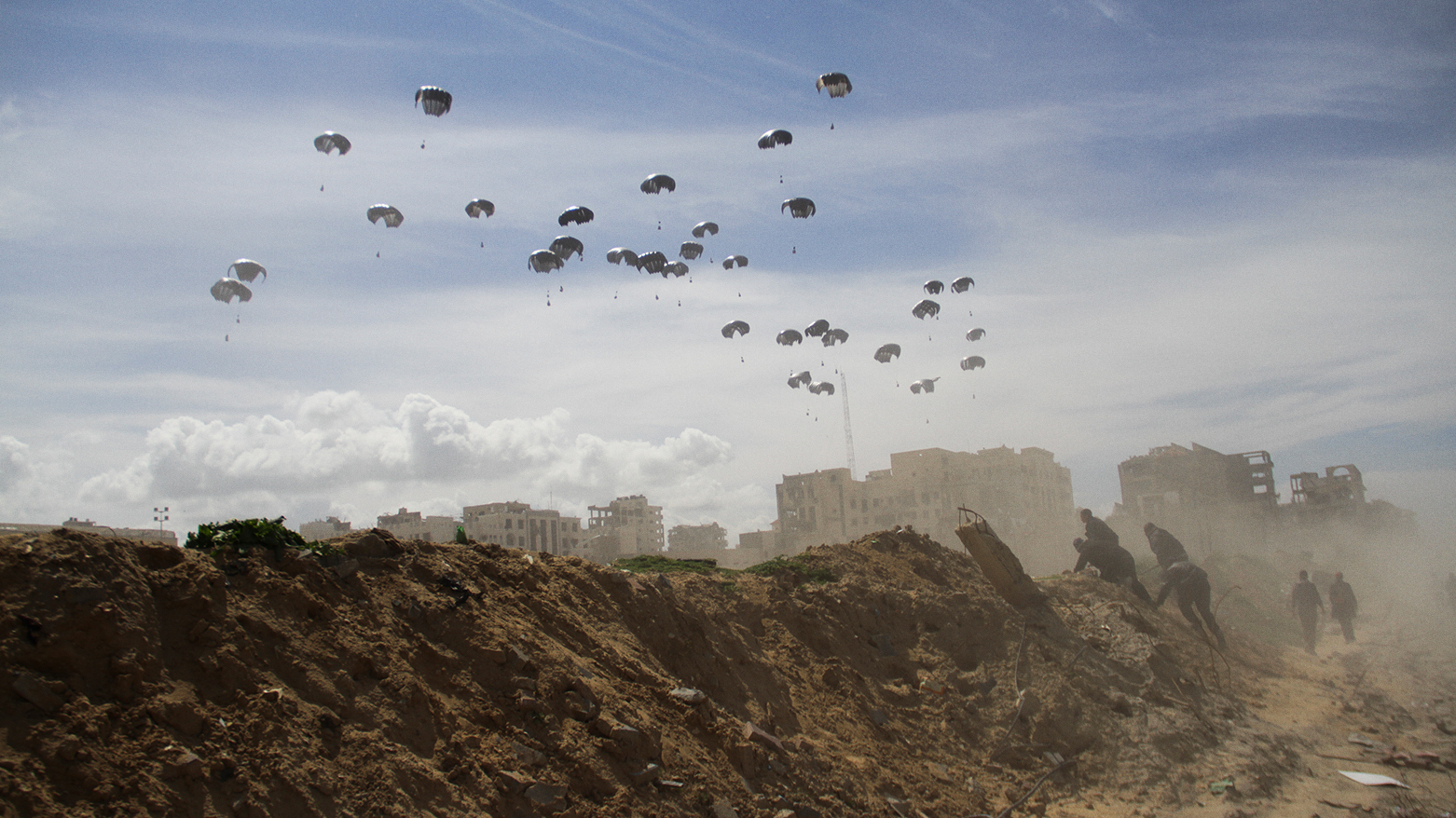A US ship with equipment for building a pier is on its way to Gaza, part of a plan to ramp up aid

DEIR AL-BALAH, Gaza Strip (AP) — A U.S. Army vessel carrying equipment for building a temporary pier in Gaza was on its way to the Mediterranean on Sunday, three days after U.S. President Joe Biden announced plans to ramp up aid deliveries by sea to the besieged enclave where hundreds of thousands of Palestinians have been going hungry.
The opening of the sea corridor, along with airdrops by the U.S., Jordan and others, showed increasing alarm over Gaza’s humanitarian crisis and a new willingness to bypass Israeli control over land shipments.
Israel said it welcomed the sea deliveries and would inspect Gaza-bound cargo before it leaves a staging area in nearby Cyprus. The daily number of aid trucks entering Gaza by land over the past five months has been far below the 500 that entered before the war because of Israeli restrictions and security issues.
Meanwhile, Biden stepped up his public criticism of Israeli Prime Minister Benjamin Netanyahu. Biden said he believes Netanyahu is “hurting Israel more than helping Israel” in how he is approaching its war against Hamas in Gaza, now in its sixth month.
Speaking Saturday to MSNBC’s Jonathan Capehart, the president expressed support for Israel’s right to pursue Hamas after the militants' Oct. 7 attack on southern Israel, but said that Netanyahu “must pay more attention to the innocent lives being lost as a consequence of the actions taken.” He added that “you cannot have 30,000 more Palestinians dead."
In Gaza, Palestinian casualties continued to rise.
The Civil Defense Department said at least nine Palestinians, including children, were killed in an Israeli airstrike on a house in Gaza City late Saturday.
Footage shared by the civil defense showed first responders pulling out the dead and injured trapped in the collapsed house. One rescuer was seen holding a dead infant, before placing the limp body on a sofa amid the wreckage.
Elsewhere, the bodies of 13 people, including women and children, were taken to the main hospital in the central town of Deir al-Balah on Sunday, according to an Associated Press journalist. Relatives said the 13 were killed by Israeli artillery fire toward a large tent camp for displaced Palestinians in the coastal area east of the southern city of Khan Younis.
Israel rarely comments on specific incidents during the war. It has held that Hamas is responsible for civilian casualties because the militant group operates from within civilian areas.
The Health Ministry in Gaza said Saturday that at least 30,960 Palestinians have been killed since the war began. It doesn’t differentiate between civilians and combatants in its count but says women and children make up two-thirds of the dead. The ministry is part of the Hamas-run government, and its figures from previous wars have largely matched those of the U.N. and independent experts.
Meanwhile, U.S. efforts got under way to set up the temporary pier in Gaza for the sea deliveries. U.S. Central Command said a first U.S. Army vessel, the General Frank S. Besson, left a base in Virginia on Saturday and was on its way to the Eastern Mediterranean with equipment for pier construction.
United States officials said it will likely be weeks before the pier is operational.
The sea corridor is backed by the EU together with the United States, the United Arab Emirates and other countries. The European Commission has said that U.N. agencies and the Red Cross will also play a role.
A ship belonging to Spain’s Open Arms aid group was expected to make a pilot voyage to test the corridor as early as this weekend. The ship has been waiting at Cyprus’s port of Larnaca.
Open Arms founder Oscar Camps has said the ship, which is pulling a barge with 200 tons of rice and flour, would take two to three days to arrive at an undisclosed location.
A member of the charity World Central Kitchen, which is also involved in the test run, said in a post on X that once the barge reaches Gaza, the aid would be off-loaded by a crane, be placed on trucks and driven to northern Gaza, which has been largely cut off from aid shipments.
Senior aid officials have warned that air and sea deliveries can’t make up for a shortage of supply routes on land.
The new push for getting more aid in came on the eve of the Muslim holy month of Ramadan, which follows a lunar calendar and could start as early as Sunday evening, depending on the sighting of a crescent moon.
Israel declared war on Oct. 7 after Hamas militants attacked southern Israel, killing about 1,200 people, mostly civilians and taking 250 hostages. Israel's blistering air and ground offensive has devastated large parts of Gaza, displaced about 80% of the population of 2.3 million and set off a worsening humanitarian crisis.
The U.S. and regional mediators Egypt and Qatar had hoped to have a six-week cease-fire in place by the start of Ramadan, but talks appeared to be stalled, with Hamas holding out for assurances that a temporary truce will lead to an end of hostilities.
Mediators had hoped to alleviate some of the immediate crisis with the temporary cease-fire, which would have seen Hamas release some of the Israeli hostages it’s holding, Israel release some Palestinian prisoners and aid groups be given access for a major influx of assistance into Gaza.
